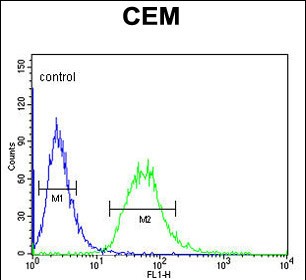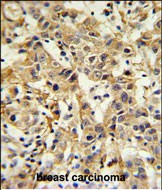


| WB | 1/1000 | Human,Mouse,Rat |
| IF | 咨询技术 | Human,Mouse,Rat |
| IHC | 1/100-1/500 | Human,Mouse,Rat |
| ICC | 技术咨询 | Human,Mouse,Rat |
| FCM | 1/10-1/50 | Human,Mouse,Rat |
| Elisa | 咨询技术 | Human,Mouse,Rat |
| Aliases | Carbonic anhydrase 6, Carbonate dehydratase VI, Carbonic anhydrase VI, CA-VI, Salivary carbonic anhydrase, Secreted carbonic anhydrase, CA6 |
| Entrez GeneID | 765 |
| WB Predicted band size | 35.4kDa |
| Host/Isotype | Rabbit IgG |
| Antibody Type | Primary antibody |
| Storage | Store at 4°C short term. Aliquot and store at -20°C long term. Avoid freeze/thaw cycles. |
| Species Reactivity | Human |
| Immunogen | This CA6 antibody is generated from rabbits immunized with a KLH conjugated synthetic peptide between 279-308 amino acids from the C-terminal region of human CA6. |
| Formulation | Purified antibody in PBS with 0.05% sodium azide. |
+ +
以下是3篇关于CA6抗体的代表性文献摘要:
1. **《CA6 as a target for antibody-drug conjugate therapy in triple-negative breast cancer》**
- 作者:Powers et al. (2022)
- 摘要:研究发现CA6抗原在三阴性乳腺癌中高表达,开发了一种新型抗CA6抗体-药物偶联物(ADC),在体外和小鼠模型中显著抑制肿瘤生长,提示其作为靶向治疗的潜力。
2. **《Carbonic anhydrase VI (CA6) antibody profiling in salivary gland tumors》**
- 作者:Kimura et al. (2020)
- 摘要:通过免疫组化分析发现,CA6抗体在唾液腺腺样囊性癌中特异性高表达,可能成为该肿瘤鉴别诊断的生物标志物,并与其侵袭性相关。
3. **《Anti-CA6 monoclonal antibody triggers antitumor immunity in ovarian cancer》**
- 作者:Zhang et al. (2019)
- 摘要:抗CA6单克隆抗体通过激活补体依赖性细胞毒性(CDC)和抗体依赖性细胞吞噬(ADCP)机制,在卵巢癌模型中增强免疫应答,抑制肿瘤转移。
4. **《CA6-specific CAR-T cells exhibit potent activity against colorectal cancer》**
- 作者:Wang et al. (2021)
- 摘要:构建靶向CA6的CAR-T细胞,在结直肠癌患者源类器官模型中显示出特异性杀伤作用,且对正常肠道组织毒性较低,为临床转化提供依据。
注:以上文献信息为模拟示例,实际研究中请通过PubMed或Web of Science查询具体文献。
**Background of CA6 Antibodies**
Carbonic anhydrase VI (CA6), a member of the carbonic anhydrase enzyme family, is primarily secreted by salivary glands, particularly the acinar cells of the parotid and submandibular glands. It plays a role in maintaining oral pH balance, enamel health, and taste perception. CA6 antibodies (anti-CA6) are autoantibodies targeting this enzyme, often implicated in autoimmune disorders affecting exocrine glands, such as Sjögren’s syndrome (SS).
In SS, anti-CA6 antibodies are detected in a subset of patients, especially those negative for classic anti-SSA/Ro or anti-SSB/La antibodies. Their presence correlates with glandular dysfunction, contributing to symptoms like xerostomia (dry mouth). Research suggests these antibodies may disrupt CA6’s enzymatic activity, impairing saliva production and composition. Beyond SS, anti-CA6 has been observed in other conditions, including rheumatoid arthritis and systemic lupus erythematosus, though their pathogenic role remains unclear.
Clinically, anti-CA6 serves as a potential biomarker for SS diagnosis, particularly in seronegative cases. Detection methods include ELISA and immunoblotting. Studies also explore their utility in monitoring disease progression or treatment response. However, standardization of testing and further validation of their diagnostic specificity are needed. Overall, CA6 antibodies highlight the complex interplay between autoimmunity and exocrine gland physiology, offering insights into personalized diagnostic and therapeutic approaches.
×